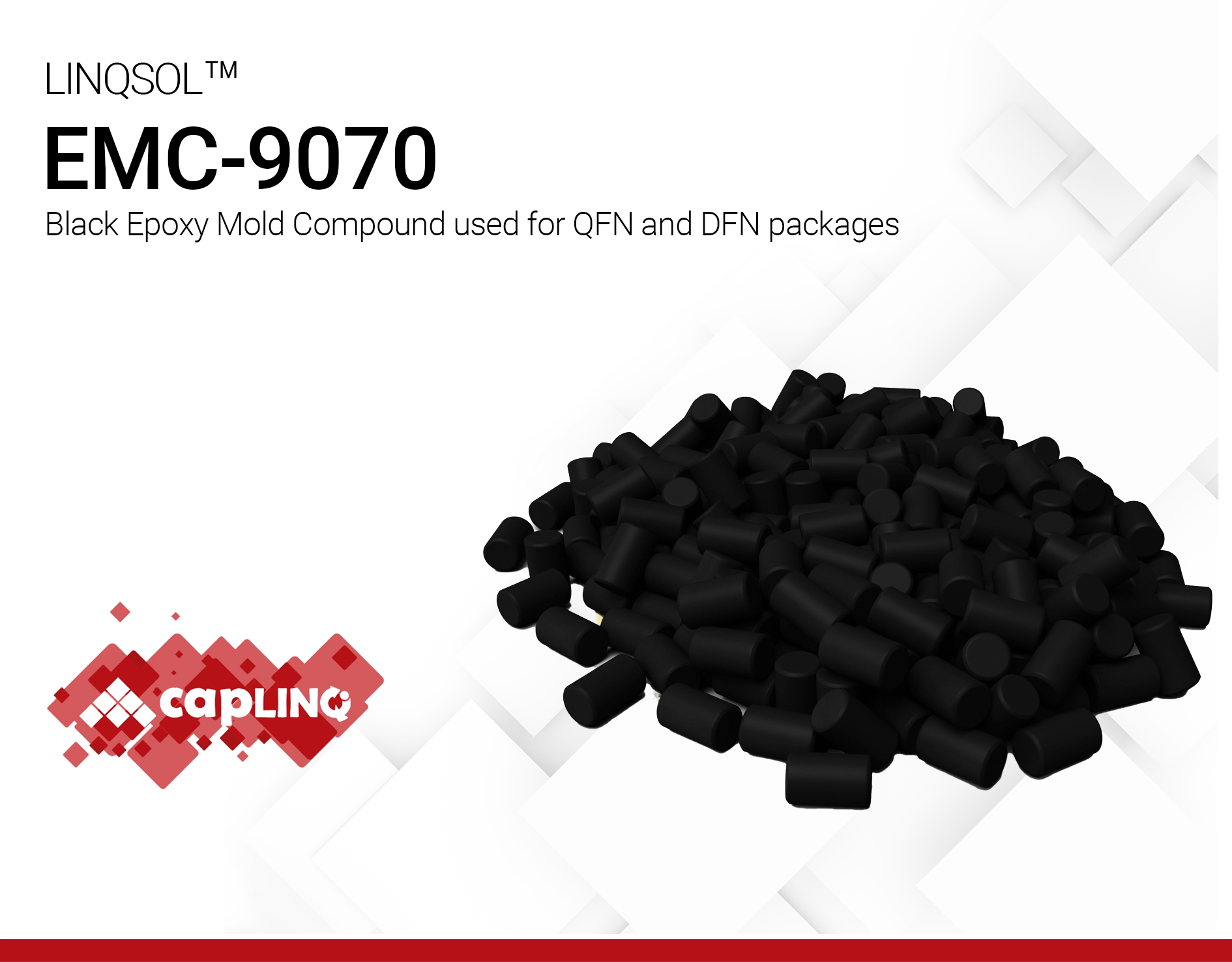LINQSOL EMC-9070 | Black Epoxy Mold Compound
- MSL1 260°C
- Designed for QFN and DFN packages
- Moisture Corrosion Resistance
Product Description
LINQSOL EMC-9070 is a black semiconductor-grade epoxy molding compound designed for the encapsulation and protection of quad-flat no-leads (QFN) and dual-flat no-leads (DFN). Once molded and post-mold cured, this product provides optimum protection and reliability for these semiconductor devices.
LINQSOL EMC-9070 is a spherical silica filled (89%) EMC, typically used for QFN and DFN packages. QFN and DFN packages are low-profile packages that are MAP molded. This means that the packages are molded together in one large mold and then separated by cutting through the entire package. Epoxy molding compounds made for these types of packages must have a low warpage, and EMC-9070 is no exception. This product is formulated to have very low internal stress to reduce warpage, as well as low moisture absorption to increase MSL performance.
Key Features:
- JEDEC MSL 1 @260°C
- Low CTE (8ppm) and mold shrinkage (<0.2%)
- Low moisture absorption (0.33% after PCT 96hrs@121°C)
- Halogen-free (contains no br, Sb, P, etc.)
- REACH and RoHS compliant
- UL 94 V-0 Flammability
Application: QFN and DFN Packages
Technical Specifications
| General Properties | |||||||
| Color Color The color | black | ||||||
| Filler Content | 89 % | ||||||
| Specific Gravity Specific Gravity Specific gravity (SG) is the ratio of the density of a substance to the density of a reference substance; equivalently, it is the ratio of the mass of a substance to the mass of a reference substance for the same given volume. For liquids, the reference substance is almost always water (1), while for gases, it is air (1.18) at room temperature. Specific gravity is unitless. | 2.01 | ||||||
| |||||||
| Physical Properties | |||||||
| Spiral Flow @ 175°C | 127 cm | ||||||
| Chemical Properties | |||||||
| |||||||
| Moisture absorption | 0.33 % | ||||||
| Mechanical Properties | |||||||
| |||||||
| |||||||
| |||||||
| Molded Shrinkage | 0.2 % | ||||||
| |||||||
| Thermal Properties | |||||||
| |||||||
| |||||||
| Glass Transition Temperature (Tg) Glass Transition Temperature (Tg) The glass transition temperature for organic adhesives is a temperature region where the polymers change from glassy and brittle to soft and rubbery. Increasing the temperature further continues the softening process as the viscosity drops too. Temperatures between the glass transition temperature and below the decomposition point of the adhesive are the best region for bonding. The glass-transition temperature Tg of a material characterizes the range of temperatures over which this glass transition occurs. | 126 °C | ||||||
Additional Information
| PROPERTIES | UNITS | EMC-9070 | EMC-9070SF | EMC-9070P |
| Epoxy Type | - | Biphenyl | Biphenyl | Biphenyl |
| Hardener Type | - | Hydrophobic | Hydrophobic | Hydrophobic |
| Flame Retardant | - | Metal Hydroxide | Metal Hydroxide | Metal Hydroxide |
| Filler Content | % | 89 | 86 | 86.5 |
| Filler Sieved Size | um | 75 | 75 | 75 |
| Specific Gravity | - | 2.01 | 1.96 | 1.98 |
| Spiral Flow @175°C | inches | 50 | 79 | 54 |
| Gel Time @175°C | seconds | 35 | 40 | 24 |
| Glass Transition Temperature | °C | 126 | 126 | 126 |
| CTE by TMA, α1 | ppm/°C | 8 | 13 | 11 |
| CTE by TMA, α2 | ppm/°C | 30 | 45 | 39 |
| Hot Hardness, 120 sec@175°C | Shore D | 83 | 79 | 85 |
| Flexural Strength @25°C | MPa | 160 | 113 | 158 |
| Flexural Modulus @25°C | GPa | 26 | 21 | 23 |
| Moisture Absorption, PCT 96hrs@121°C | % | 0.33 | 0.40 | 0.40 |
| Mold Shrinkage | % | <0.2 | <0.3 | <0.3 |
Ionic Impurities (20hrs @160°C) pH Na+ Cl- |
- ppm ppm |
6.8 6.7 4.1 |
6.9 7.3 4.0 |
6.9 7.2 4.0 |
| Comments | General product for most QFN packages | Long spiral flow with good warpage control for large L/F and panel | Short gel time with good warpage control for productivity |




